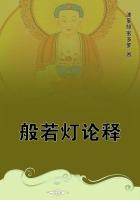She said to herself that it was but common charity to stay a little with her aunt.It was fortunate she had so good a formula; otherwise she might have been greatly in want of one.Her errand was over; she had done what she had left her husband to do.She had a husband in a foreign city, counting the hours of her absence; in such a case one needed an excellent motive.He was not one of the best husbands, but that didn't alter the case.Certain obligations were involved in the very fact of marriage, and were quite independent of the quantity of enjoyment extracted from it.Isabel thought of her husband as little as might be; but now that she was at a distance, beyond its spell, she thought with a kind of spiritual shudder of Rome.There was a penetrating chill in the image, and she drew back into the deepest shade of Gardencourt.She lived from day to day, postponing, closing her eyes, trying not to think.She knew she must decide, but she decided nothing; her coming itself had not been a decision.On that occasion she had simply started.Osmond gave no sound and now evidently would give none; he would leave it all to her.From Pansy she heard nothing, but that was very ******: her father had told her not to write.
Mrs.Touchett accepted Isabel's company, but offered her no assistance; she appeared to be absorbed in considering, without enthusiasm but with perfect lucidity, the new conveniences of her own situation.Mrs.Touchett was not an optimist, but even from painful -occurrences she managed to extract a certain utility.This consisted in the reflexion that, after all, such things happened to other people and not to herself.Death was disagreeable, but in this case it was her son's death, not her own; she had never flattered herself that her own would be disagreeable to any one but Mrs.
Touchett.She was better off than poor Ralph, who had left all the commodities of life behind him, and indeed all the security; since the worst of dying was, to Mrs.Touchett's mind, that it exposed one to be taken advantage of.For herself she was on the spot; there was nothing so good as that.She made known to Isabel very punctually-it was the evening her son was buried several of Ralph's testamentary arrangements.He had told her everything, had consulted her about everything.He left her no money; of course she had no need of money.He left her the furniture of Gardencourt, exclusive of the pictures and books and the use of the place for a year; after which it was to be sold.The money produced by the sale was to constitute an endowment for a hospital for poor persons suffering from the malady of which he died; and of this portion of the will Lord Warburton was appointed executor.The rest of his property, which was to be withdrawn from the bank, was disposed of in various bequests, several of them to those cousins in Vermont to whom his father had already been so bountiful.Then there were a number of small legacies.
"Some of them are extremely peculiar," said Mrs.Touchett; "he has left considerable sums to persons I never heard of.He gave me a list, and I asked then who some of them were, and he told me they were people who at various times had seemed to like him.Apparently he thought you didn't like him, for he hasn't left you a penny.It was his opinion that you had been handsomely treated by his father, which I'm bound to say I think you were-though I don't mean that Iever heard him complain of it.The pictures are to be dispersed; he has distributed them about, one by one, as little keepsakes.The most valuable of the collection goes to Lord Warburton.And what do you think he has done with his library? It sounds like a practical joke.He has left it to your friend Miss Stackpole-'in recognition of her services to literature.' Does he mean her following him up from Rome? Was that a service to literature? It contains a great many rare and valuable books, and as she can't carry it about the world in her trunk he recommends her to sell it at auction.She will sell it of course at Christie's, and with the proceeds she'll set up a newspaper.Will that be a service to literature?"This question Isabel forbore to answer, as it exceeded the little interrogatory to which she had deemed it necessary to submit on her arrival.Besides, she had never been less interested in literature than to-day, as she found when she occasionally took down from the shelf one of the rare and valuable volumes of which Mrs.Touchett had spoken.She was quite unable to read; her attention had never been so little at her command.One afternoon, in the library, about a week after the ceremony in the churchyard, she was trying to fix it for an hour; but her eyes often wandered from the book in her hand to the open window, which looked down the long avenue.It was in this way that she saw a modest vehicle approach the door and perceived Lord Warburton sitting, in rather an uncomfortable attitude, in a corner of it.He had always had a high standard of courtesy, and it was therefore not remarkable, under the circumstances, that he should have taken the trouble to come down from London to call on Mrs.
Touchett.It was of course Mrs.Touchett he had come to see, and not Mrs.Osmond; and to prove to herself the validity of this thesis Isabel presently stepped out of the house and wandered away into the park.Since her arrival at Gardencourt she had been but little out of doors, the weather being unfavourable for visiting the grounds.
This evening, however, was fine, and at first it struck her as a happy thought to have come out.The theory I have just mentioned was plausible enough, but it brought her little rest, and if you had seen her pacing about you would have said she had a bad conscience.















